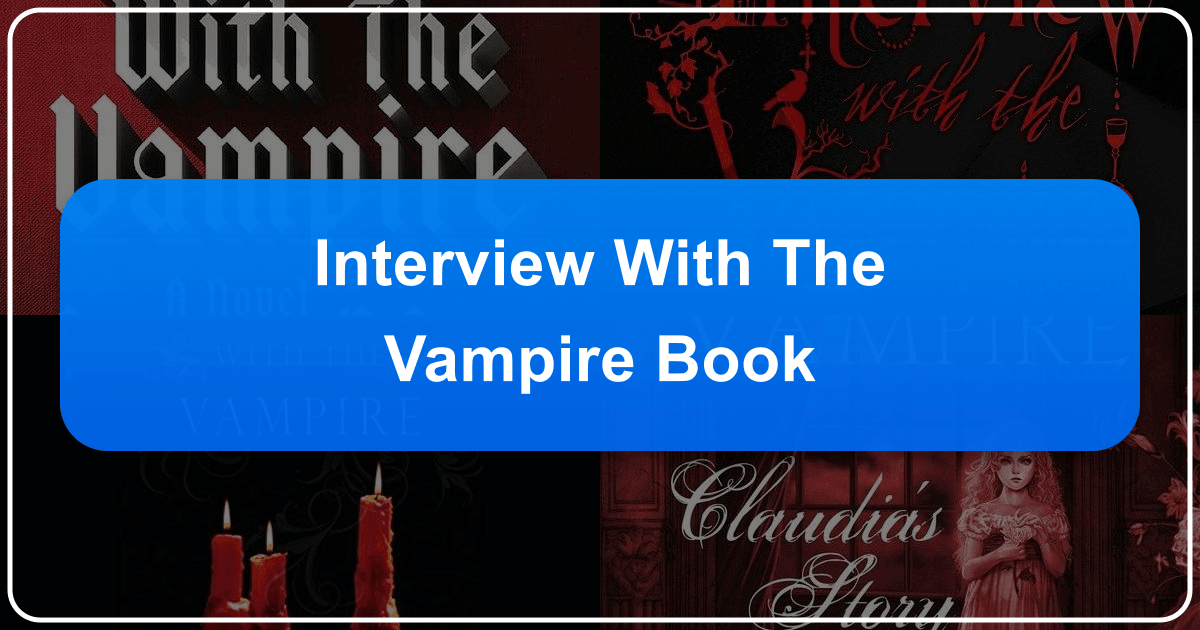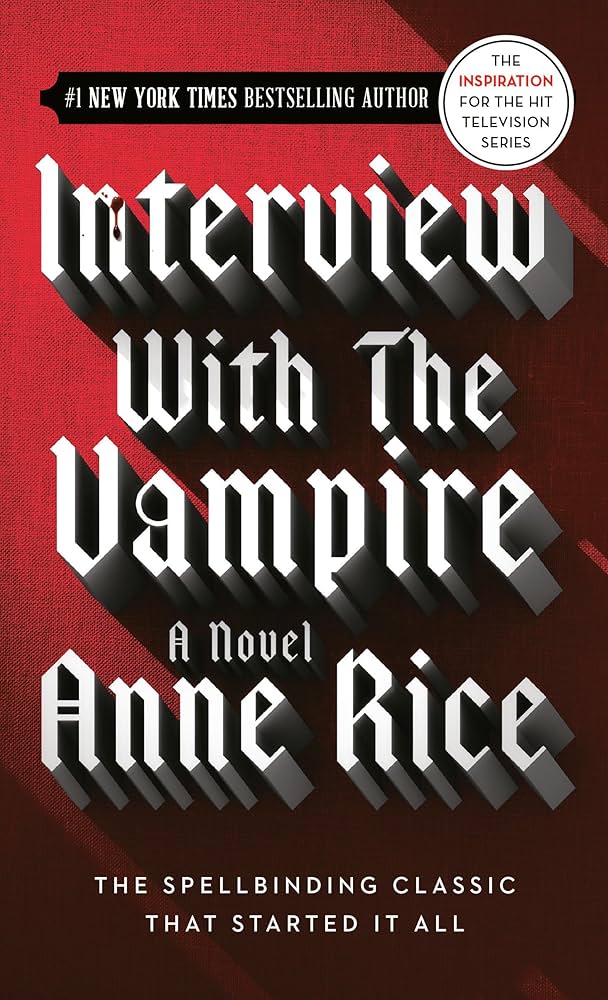*Interview with the Vampire*: A Deep Dive into Anne Rice's Gothic Masterpiece

Anne Rice’s Interview with the Vampire, first published in 1976, transcends the typical vampire novel. It’s a complex exploration of immortality, morality, and the human condition, told through the captivating, albeit flawed, narrative of Louis de Pointe du Lac. This essay will analyze the novel through several lenses, exploring its genre, authorial style, cultural impact, and enduring legacy, drawing upon key themes often discussed on literature and reading-focused websites.
Genre and Literary Classification
Interview with the Vampire defies easy categorization. While firmly rooted in the horror genre, its gothic atmosphere, psychological depth, and exploration of existential themes elevate it beyond simple thrills and chills. It’s a vampire novel, yes, but one that redefines the creature of the night, moving away from the purely monstrous depictions of earlier works like Bram Stoker’s Dracula towards a more nuanced, psychologically complex portrayal. The novel’s exploration of themes like loneliness, identity, and the struggle between good and evil positions it within the broader realm of literary fiction. The intimate, confessional structure of the narrative, resembling an extended interview, further distinguishes it, blurring the lines between fiction and reality, adding a metafictional layer to the already rich tapestry of the story. The novel’s exploration of complex themes, such as the moral implications of immortality and the nature of good and evil, elevates it into the realm of literary fiction that can be enjoyed and discussed in literature classes.

Gothic Horror and Southern Gothic Elements
The novel’s setting, 18th-century Louisiana, is crucial to its atmosphere. Rice masterfully utilizes elements of Southern Gothic, incorporating the region’s history of slavery, its decadent beauty, and its pervasive sense of decay and mystery. The opulent plantations stand in stark contrast to the shadowed streets of New Orleans, creating a palpable tension between elegance and horror. This setting is integral to the novel’s gothic horror elements, with its emphasis on the macabre, the supernatural, and the exploration of dark, repressed emotions. The juxtaposition of the beautiful and the grotesque, the civilized and the savage, is a hallmark of the Gothic tradition, and Rice uses it to masterful effect in depicting the vampire world.

Anne Rice: Authorial Style and Inspirations
Anne Rice’s distinctive writing style is a significant contributor to the novel’s success. Her prose is lush, evocative, and highly descriptive, creating a vivid and immersive reading experience. She uses language with precision and sensitivity, capturing the emotional turmoil of her characters and the atmosphere of their surroundings with equal skill. Her sentences are often long and flowing, reflecting the languid pace of the narrative and the endlessness of the vampire existence. This style, while sometimes criticized for being overly verbose, contributes to the novel’s gothic atmosphere and creates a sense of intimacy with the narrator, Louis.

Rice’s Exploration of Religious and Philosophical Themes
Rice’s Catholic upbringing significantly influences her work. Interview with the Vampire explores religious themes of good and evil, faith and doubt, and the nature of salvation. Louis, the narrator, grapples with his own spiritual turmoil, constantly questioning his actions and his place in the world. This spiritual struggle, often described in detailed philosophical musings and introspection, adds another dimension to the novel’s exploration of the vampire condition. The philosophical inquiries into existence, morality, and the nature of the supernatural become a central theme of the novel that further adds to its literary depth and interest. The blend of religious imagery and philosophical questioning provides a rich intellectual context that is central to the thematic concerns of the novel.
Cultural Impact and Adaptations
Interview with the Vampire has had a profound and lasting impact on popular culture. It is widely credited with revitalizing the vampire genre in modern literature, influencing countless subsequent novels, films, and television shows. The novel’s exploration of sympathetic vampires, grappling with moral dilemmas and existential angst, opened up new creative possibilities for the genre, moving beyond the simplistic monster versus hero trope. The portrayal of the complexities and emotional weight of the vampire condition that Interview with the Vampire introduced continues to serve as an inspiration for many vampire-based fiction works.
Film and Television Adaptations
The novel has been adapted into multiple film and television formats. The 1994 film adaptation, starring Tom Cruise and Brad Pitt, was a significant cultural event and introduced Interview with the Vampire to a wider audience. While the film takes some liberties with the source material, particularly in the portrayal of Lestat and Claudia’s ages, it captured the gothic atmosphere and the emotional complexity of the characters’ relationships. The more recent AMC series adaptation further expands upon the source material with more nuanced explorations of the novel’s themes. Its detailed portrayal of the characters and their relationships with other vampires have opened a new lens to understand and discuss the novel and its significance.
Reading Habits and Educational Value
Interview with the Vampire is a complex and challenging read, rewarding those who engage with its multi-layered narrative and philosophical themes. Its rich descriptions and long, flowing sentences demand a patient and thoughtful approach. It’s a book best savored over time, allowing the reader to fully appreciate the nuances of Louis’s character and the atmosphere of the world he inhabits. The novel’s themes of immortality, loss, and the struggle for meaning can provide significant educational value, prompting readers to contemplate their own lives and their understanding of mortality and the human condition. It’s a book that encourages thoughtful reflection on the complexities of human relationships and the human experience. The novel’s lasting impact on the vampire genre and its insightful explorations of morality and the human condition make it a truly valuable piece of fiction that transcends generations.
Life Lessons and Personal Growth
The novel offers readers insights into several profound aspects of the human condition. Louis’s journey is one of self-discovery, grappling with the consequences of his choices and seeking a sense of belonging in an alien world. His internal conflicts and spiritual questioning can resonate deeply with readers dealing with similar struggles. The novel’s exploration of complex and often destructive relationships, both human and vampiric, provides valuable lessons about the dynamics of love, betrayal, and forgiveness. The relationships within the vampire community, as depicted in Interview with the Vampire, are especially compelling for their exploration of complex power dynamics and the struggle for identity and autonomy within them. The portrayal of how those in power over others use their influence to harm or manipulate serves as a cautionary tale and an opportunity to discuss those issues within a literary context. The book offers valuable life lessons and the opportunity for personal growth, all while providing a captivating and memorable reading experience.
Summaries and Discussion Points
The novel’s narrative structure lends itself to summaries and discussions. Louis’s recounting of his life provides a clear framework for outlining key plot points and thematic developments. The exploration of the vampire condition, the complex relationships between Louis, Lestat, and Claudia, and the philosophical musings on mortality and the human condition are all rich topics for discussion and analysis. The novel is a rich source for exploring multiple thematic elements, making it a valuable addition to any reading list, classroom discussions, or literary clubs. Its enduring popularity and relevance continue to attract new readers, writers, and creators across various media, ensuring its status as a Gothic classic. The enduring appeal of Interview with the Vampire lies in its masterful storytelling, its exploration of timeless themes, and its enduring legacy in shaping the vampire genre.